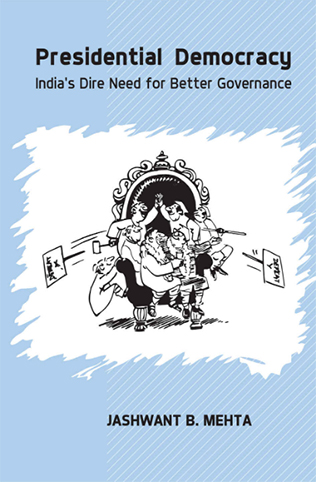BOOK REVIEW
Presidential Democracy: India’s Dire Need for a Better Governance by Jashwant B. Mehta (Forum for Presidential Democracy, 2019)
Oishani Nandi reviews this book on whether India is in dire need to have a presidential form of government to ensure better governance.
 Presidential Democracy by Jashwant B. Mehta
Presidential Democracy by Jashwant B. Mehta

With the recent re-election of PM Narendra Modi in 2019, still, fresh in public discourse, highly regarded intellects and the layman alike are jostling with the nature of our political and electoral institutions. With the prime time news hour filled with disgruntled intellectuals voicing dissatisfaction with issues such as corruption, scandals, iconisation of a few political leaders, nepotism, the disproportionate representation of the public sentiment and an atmosphere of communal tension, invariably resulting in solutionless mud-slinging. The political system in India currently remains as a parliamentary democracy (in which the party (or coalition of parties) with the greatest representation in parliament forms the government), similar to our colonial counterpart. With its numerous flaws, this book attempts to propose an alternative solution, a Presidential Democracy.
Situating his thesis in this environment of current political disaffection, the author Jashwant B. Mehta brings the Indian political framework under his critical lens. Mehta has authored two highly regarded treatises, Presidential System - A Better Alternative? and Quest for a Better Democratic Alternative, which explores the many multifaceted advantages of a truly democratic system and compares the Indian governmental model with that of its ‘successful’ foreign counterparts. With the help of epigrammatic language and powerful rhetorics, Mehta brings a very controversial and dynamic perspective to the existing debate. Anticipating a disastrous reckoning, he calls upon the need of the hour to address the cataclysmic Indian parliamentary system and initiate remedial measures before it’s too late.
Through this book the author has raised several issues and critical arguments in the form of 13 well-crafted chapters, wherein he enlists the issues crippling the political fabric of our richly diverse country. Mehta builds the premise to his argument by explicating the roles of governing bodies within an international scope in the first chapter. The author then proceeds to share insight into the age-old dichotomy of ‘Democracy vs. Dictatorship’, where he emphatically delineates the irrefutable effectiveness of democracy. Building his argument steadily, Mehta deftly traces the historical development of our party system, concluding the efficacy of a bipartisan system for sustained stability in the governance of India. He also cites Ambedkar's endorsement for a Presidential Democracy. In Chapter 4, he vehemently lays down the need for a clear separation between the executive and the legislative branch, in order to curb the rampant corruption which has established itself in the roots of our political landscape. He explores this in great length by discussing the pandemic of ministerial corruption is brought to light. The following chapter identifies potent concerns regarding the legislature, compares it with international models and thereby proposes steps to strengthen the cracks and crevices in our legislative branches. Mehta then substantiates his arguments with numerous case studies ranging from the instances of political defection and corruption identified in the regional states to the passing of the Anti Defection Act to the enactment of the 91st constitutional amendment act. To further add merit in his argument, the author discusses the failed implementation of Checks and Balances in our current system of governance and calls for an immediate separation of power which would hold the three branches more accountable. Having dealt with the potholes in the foundational structure, the author progresses to discuss the indispensable role of a true leader which can only be fulfilled by giving the dais to deserving candidates. Very aptly, he explores the same issue in the following chapter, wherein he proposes solutions to make our elections more fruitful in favour of those really deserve, doing away with the vestiges of nepotism and/or favouritism. Calling for electoral reforms in Chapter 11, Mehta critiques the various electoral systems implemented in foreign countries and poses forceful remodelling for our elections. The author proceeds into his defence of and justification for highlighting the US Model in his treatise, whilst also deftly addressing frequently asked questions regarding argument for imbibing modifications suggested. In his final testament against the current parliamentary system, he highlights the urgency of the Indian situation for democratic reforms, while simultaneously anticipating the likely hurdles that may emerge on his roadmap.
As Lord Acton once famously said, “Power tends to corrupt; absolute power corrupts absolutely.” Mehta warns of the potential dangers of iconisation of the PM, whose all-encompassing powers come under the threat of being undemocratic in nature. He also highlights the inadequacy of the current parliamentary democracy where a PM without majority support is rendered powerless. The very subtitle of this book highlights the dire need for a shift in political systems, to one that limits corruption at its roots. This book lays the foundation for a more functional and effective government. To conclude, a striking feature to be noted of the book could be his bringing of the ‘sacred, sanctimonious’ constitution into debate, not to denigrate it, but to trace its flaws and reconstruct and seal in the fault lines.
oishani.nandi@oberoi-is.net.
- FIR Copy of Mahatma Gandhi assasination case
- Licito Concurso'20
- Rules for Licito Concurso '20- A National Legislative Drafting Competition
- Registration Form for Licito Concurso-20
- www.apexcourtweekly.substack.com
- www.lawupdater.com/wp/
- XIIIth K.K. Luthra Memorial Moot Court Competition 2017
- President of India Presented with the First Copy of the Book Statement of Indian Law Published by Thomson Reuters





